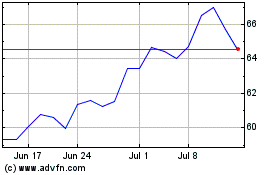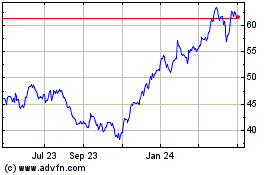Saudi Sovereign Wealth Fund Buys Stakes in Facebook, Boeing, Cisco Systems
May 16 2020 - 9:18AM
Dow Jones News
By Rory Jones and Summer Said
Dubai
In the coronavirus pandemic's financial fallout, Saudi Arabia's
$300 billion sovereign-wealth fund has emerged as one of the
world's biggest bargain hunters, taking minority stakes worth
billions of dollars in American corporations.
The Public Investment Fund in the first quarter bought shares
worth about half a billion dollars each in Facebook Inc., Walt
Disney Co., Marriott International Inc. and Cisco Systems Inc.,
according to a U.S. regulatory filing late Friday.
The fund bought financial stocks, investing $522 million in
Citigroup Inc. and $488 million in Bank of America Corp., while
also spending $714 million on a stake in Boeing Co.
The purchases, reported in a filing with the Securities and
Exchange Commission, follow disclosures last month of stakes each
worth nearly $500 million in cruise operator Carnival Corp. and
concert promoter Live Nation Entertainment Inc.
Crown Prince Mohammed bin Salman, the kingdom's day-to-day
ruler, tasked the sovereign-wealth fund in 2015 with diversifying
the country's economy away from oil by investing in companies and
industries untethered to hydrocarbons.
PIF's recent buying spree highlights a bold strategy of piling
into global stocks even as the novel coronavirus and a crash in oil
prices mean that Saudi Arabia's financial position is now the most
precarious in a decade. The Saudi government this week tripled its
value-added tax rate and cut subsidies to state employees as it
contends with lower oil revenues and an economy weakening under
coronavirus lockdown.
Many of the stocks that PIF has targeted are trading at historic
lows, bruised by the fallout from the coronavirus and rock-bottom
oil prices that have battered stocks of energy companies this
year.
While PIF has dipped into stocks in recent years, the fund has
focused more on private equity, allocating capital to managers such
as SoftBank Group Corp. Its record is mixed. PIF's $45 billion
investment in the Vision Fund has suffered losses and its
pre-listing investment in Uber Technologies Inc. of $3.5 billion is
currently down 40%.
PIF's recent equity purchases in oil firms also have bucked
Prince Mohammed's original mandate for the fund. It set out to
invest in non-oil companies that can help establish new industries
in technology, tourism and entertainment, or act as a hedge against
the decline of oil, the kingdom's biggest asset.
However, The Wall Street Journal last month reported that the
fund had bought undisclosed stakes in a bevy of energy firms,
including Equinor AS, Royal Dutch Shell PLC, Total SA and Eni
SpA.
PIF invested $484 million in Shell, $222 million in Total and
previously unreported stakes of $828 million in BP PLC., $481
million in Suncor Energy Inc. and $408 million in Canadian Natural
Resources Ltd., according to the U.S. filing.
In the first three months of the year, PIF bought stakes worth
$496 million in Disney, $522 million in Facebook, $491 million in
Cisco and $514 million in Marriott, the filing shows.
It also purchased shares worth roughly $80 million each in
Warren Buffett's Berkshire Hathaway Inc.; chip makers Broadcom Inc.
and Qualcomm Inc.; International Business Machines Corp.; drugmaker
Pfizer Inc.; Starbucks Corp.; railroad firm Union Pacific Corp.;
outsourcer Automatic Data Processing Inc.; and Booking Holdings
Inc., the parent company of Booking.com.
On top of the stakes in public companies, PIF also is awaiting
regulatory approval for a roughly GBP300 million ($380 million)
buyout of U.K. Premier League soccer team Newcastle United F.C.
Write to Rory Jones at rory.jones@wsj.com and Summer Said at
summer.said@wsj.com
(END) Dow Jones Newswires
May 16, 2020 09:03 ET (13:03 GMT)
Copyright (c) 2020 Dow Jones & Company, Inc.
Citigroup (NYSE:C)
Historical Stock Chart
From Mar 2024 to Apr 2024

Citigroup (NYSE:C)
Historical Stock Chart
From Apr 2023 to Apr 2024
